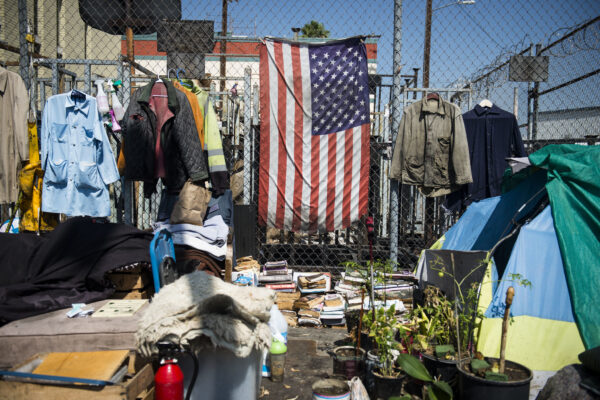
Homeless Veterans can be found residing on Skid Row, an area in Downtown Los Angeles. (Photo: Airman Magazine)
Recent data from the U.S. Department of Housing and Urban Development, or HUD, revealed a surge in homelessness among Veterans and throughout the nation, prompting urgent responses from HUD and VA.
HUD reported a 12% surge in the total number of homeless Americans, reaching over 650,000, from January 2022 to January 2023—a record increase. Among the total count of 650,000 individuals experiencing homelessness, approximately 35,570 were identified as Veterans lacking permanent housing, indicating a 7.4% surge compared to 2022. Of this Veteran population, an estimated 15,500 are classified by the VA and HUD as “unsheltered,” residing in cars, parks, abandoned structures, and on the streets — an uptick of 14.3% from the previous year.
Various factors contributed to the surge in Veteran homelessness, including escalating rents nationwide, the resumption of eviction proceedings paused during the COVID-19 pandemic, and a shortage of affordable housing. According to the National Coalition for Homeless Veterans, the increase in Homeless Veterans reflects a broader crisis in housing affordability, signaling the need for urgent intervention.
“Homelessness is solvable,” declared HUD Secretary Marcia Fudge in a statement, emphasizing the need for immediate support and proven strategies to reverse the unsettling upward trend.
The unexpected rise in Veteran homelessness has taken the VA by surprise, as the department had reported in November that its programs had surpassed the goal of housing 38,000 homeless Veterans in 2023. Despite this achievement, it became apparent that the demand for homeless assistance resources exceeded the existing capacity.
To combat this growing challenge, VA is seeking funding approval from Congress to enhance spending on Supportive Services for Veteran Families, or SSVF, Grants. These funds would be allocated to organizations across the nation dedicated to assisting Veterans and their families at risk of losing their homes or aiding them in securing more suitable housing options.
In addition to the increased funding for SSVF Grants, the VA plans to allocate over $26 million to organizations providing legal representation for Veterans facing eviction and defending them in criminal cases related to homelessness.
VA Secretary Denis McDonough expressed the importance of these proposed grants, describing them as critical components in the agency’s overarching efforts to provide expanded housing and services to homeless and at-risk Veterans.
As the nation grapples with the housing affordability crisis, the proposed funding increase comes at a crucial time, seeking to address the immediate needs of Veterans experiencing homelessness while also preventing future instances through targeted and proven strategies. VA Secretary McDonough affirms their dedication to working tirelessly until Veteran homelessness is eradicated.













